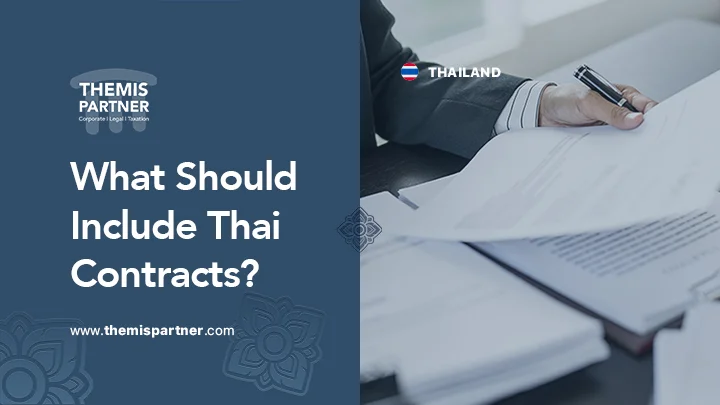Thailand Contract Law demands more than just a signature: nearly 70% of contract disputes in Thai courts arise from missing or unclear terms. Are you certain every agreement you sign includes all elements required for legal enforceability in Thailand?

Even a small oversight like misnaming a party or omitting a mandatory clause can lead to costly disputes or voided contracts, especially in regulated sectors.
Business owners and professionals navigating Thailand’s commercial landscape face evolving expectations, tighter sector regulations, and rising international transactions requiring bilingual precision. With new government guidance on e-signatures and digital contracts, understanding which clauses are non-negotiable is now essential.
Key Takeaways
- Mutual consent and clear intent are vital for a valid Thai contract, over 70% of disputes arise from unclear agreements or lack of true consent.
- Accurate party identification protects enforceability: always include full legal names, addresses, and official identification (personal or corporate) for every participant.
- Legal capacity and lawful purpose are essential, parties must be age 20 or over, mentally sound, and acting within the law for the agreement to stand up in court.
- Reciprocal value (consideration) is required in every Thai contract: both sides must offer or promise something of value, such as payment, services, or deliverables.
- Define all contract terms with clarity by specifying payment, timelines, obligations, and renewal mechanisms to prevent enforceability issues and reduce legal risk.
- Observe formality requirements for specific contracts: written and signed documents are mandatory for land sales, long leases, guarantees, and certain employment agreements.
- Include clear dispute resolution clauses detailing governing law, dispute venue, and arbitration options to avoid costly delays and cross-border confusion.
- Update contracts for sector regulations and digital advancements by including mandatory statutory terms and using e-signatures only when permitted for enforceable agreements in Thailand.
Table of Contents
Essential Elements of Thailand Contract Law
Legal Capacity, Lawful Purpose and Consideration
Certainty, Clarity, and Contractual Terms
Dispute Resolution & Statutory Provisions
Smart Contracts & Drafting Best Practices
FAQ: Thailand Contract Law Essentials
Conclusion
Essential Elements of Thailand Contract Law
Offer, Acceptance and Mutual Consent
A valid Thai contract starts with a clear offer and firm acceptance by another party. Both sides must show genuine intent to create legal relations under Thailand contract law.
Mutual consent is essential. Avoid common risks by confirming:
- All parties fully understand the terms
- No consent resulted from mistake, fraud, duress, coercion, or misrepresentation
If true consent is missing, the contract may be void or unenforceable. Statistically, over 70% of Thai contract disputes stem from unclear acceptance or defective consent.
Identifying the Parties
Thai contract validity depends on precise identification of every party involved.
Every enforceable contract should always include:
- Each party’s full legal name
- Current address
- Personal ID or passport number (for individuals)
- Corporate registration number (for companies)
Omitting or misstating party details can delay or nullify contract enforcement in Thai courts. For cross-border agreements, double-check all translation of names and legal status.
To protect contract formation Thailand, ensure each element above is included. Proper party identification and true consent are the foundation of enforceable contracts in Thailand.
Legal Capacity, Lawful Purpose and Consideration
Who Has Legal Capacity?
Thai contract law requires every party to have legal capacity to create an enforceable agreement.
Legal capacity means:
- Age 20 or older
- Mental soundness (no mental incapacity)
- Not subject to legal guardianship or restrictions
If a minor, a company lacking appropriate representation, or a person with diminished mental faculties enters a contract, the agreement may be void or contestable.
Example: A contract signed by a 17-year-old unaccompanied by a legal guardian is not enforceable under Thailand contract law.
Lawful and Enforceable Objective
A valid contract must have a lawful purpose and not violate public morals or order.
Common reasons a contract may be void under Thai law:
- Involves illegal acts or goods (e.g., sale of prohibited substances)
- Circumvents labor or tax regulations
- Contravenes the Thai Civil and Commercial Code
Example: A contract to pay for unlicensed gambling winnings in Thailand is invalid by statutory law.
Is Value Exchange Required?
Consideration (reciprocal value exchanged by both parties) is essential in contract requirements Thailand.
Unlike some common law countries, Thai law focuses on mutual obligation; both sides must promise or deliver something of value.
Consider, for example:
- Payment for goods or services
- Service exchanged for another service
Without clear mutual benefit, enforceable contracts Thailand are rare.
Ensuring every party is capable, every objective is lawful, and all promises are mutual ensures contract formation Thailand stands up to legal scrutiny.
Certainty, Clarity, and Contractual Terms
What Terms Should Never Be Left Ambiguous?
Every Thai contract must specify the key terms with absolute clarity. Uncertainty can lead to disputes or render entire sections unenforceable.
Contracts should always define:
- Payment terms: amount, currency, timing, and method
- Performance: specific obligations, timelines, and standards
- Duration: start and end dates, renewal mechanisms
- Rights and obligations: deliverables, milestones, or exclusive provisions
Ambiguous or missing terms often result in drawn-out legal conflicts. For example, a payment clause stating “as soon as possible” led to a case where Thai courts sided with the payor, ruling the contract unenforceable. Clear drafting prevents costly misunderstandings and accelerates dispute resolution.
When Must a Thai Contract Be in Writing?
Some agreements must be in writing or registered to comply with Thailand contract law.
Common contracts with formality requirements include:
- Land sales, mortgages, or leases (exceeding three years)
- Guaranty agreements and pledges
- Certain employment contracts and powers of attorney
Relying on verbal or informal agreements risks unenforceability, especially for property or security interests. Written contracts provide indisputable proof, protect all parties, and reduce legal exposure.
Written precision makes contracts enforceable and shields your business from disputes or loss. The most successful agreements spell out every detail and follow correct formalities under Thailand contract law.
Dispute Resolution & Statutory Provisions
Why Include Dispute Resolution Clauses in Thai Contracts?
Clear dispute resolution clauses are vital for enforceable contracts in Thailand.
They set expectations for governing law, dispute venue, and whether conflicts are handled by Thai courts or arbitration.
Consider these key best practices:
- Specify the chosen governing law (usually Thai law)
- State the dispute resolution method (litigation or arbitration)
- Name the jurisdiction or arbitration forum (examples: Bangkok International Arbitration Center)
Ambiguous or missing clauses often result in higher litigation costs, longer enforcement times, and cross-border confusion.
Real-case scenarios in Thailand often show that the absence of a clear dispute clause can delay outcomes by several years and increase costs by over 40%.
Reference: Bangkok International Arbitration Center for arbitration guidance.
Mandatory and Sector-Specific Provisions
Contracts in regulated sectors like employment, partnership, or foreign investment in Thailand require added protections.
Critical additional elements to include:
- Mandatory employee benefits (annual leave, severance, social security) set by the Labor Protection Act
- Partnership deeds must list profit-sharing and management rights
- Foreign investment contracts often require BOI approvals and compliance with investment caps
Missing statutory terms can make these contracts void or expose businesses to fines.
Consistently updating contracts for sector regulations keeps agreements enforceable and risk-managed.
Mandatory dispute clauses and sector-specific terms transform standard contracts into robust, enforceable agreements under Thailand contract law.
Smart Contracts & Drafting Best Practices
Are Smart Contracts Legally Valid?
Smart contracts, self-executing agreements coded on digital platforms are rising in global business, but their legal status in Thailand remains under review.
E-signatures are recognized under the Electronic Transactions Act, except for certain contracts like land transfers or wills.
Key challenges for smart contracts and e-signatures in Thailand include:
- Enforceability when the contract type requires written or registered form
- Determining intent and consent if disputes arise
- Alignment with Thai Civil and Commercial Code requirements
Recent legal commentary from the Thailand Digital Government Development Agency highlights the government’s commitment to digital transformation, yet full legal equivalence for smart contracts is still evolving (DGA Thailand).
How to Avoid Common Pitfalls in Thai Contract Drafting?
Drafting in Thailand demands more than translation, it requires clarity, context, and attention to local law.
To reduce disputes and ensure validity, always:
- Use clear, unambiguous language, especially for payment, obligations, and timelines
- Hire a qualified translator for bilingual contracts
- Double-check all names, identification numbers, and official terms
Firms managing international business should implement checklist frameworks covering legal capacity, form requirements, and dispute mechanisms tailored to cross-border or foreign-involved agreements.
Adapting contracts to Thailand’s unique requirements and digital advances empowers professionals to secure agreements that stand up in Thai courts and in practice.
FAQ: Thailand Contract Law Essentials
A valid contract under Thailand Contract Law does not always require written form, but certain agreements such as land sales, guarantees, and leases exceeding three years must be in writing to meet contract requirements Thailand.
What Makes a Thai Contract Enforceable?
To ensure enforceability and avoid common mistakes, follow these practical steps:
- Always include clear terms (such as payment, rights, and obligations)
- List full legal names, addresses, and identification of all parties
- Use bilingual drafts and seek professional legal review if dealing with cross-border agreements
Digital Validity and Missing Elements
E-signatures are generally accepted, especially for business transactions, but are not suitable for all contract types under Thai contract validity guidelines.
- Omitting essential elements like lawful purpose or valid consent can void your agreement
- Failure to comply with formalities increases risk of disputes and unenforceability
Carefully building each contract with these fundamentals can reduce risks, enhance clarity, and empower you to make confident decisions in Thailand’s evolving legal landscape.
Conclusion
A well-crafted Thai contract is more than a legal formality. It is your essential foundation for business security, clarity, and growth.
Prioritize reviewing your current contracts, update any missing elements, and ensure all documentation is bilingual and properly executed.
For expert legal review or tailored drafting in Thailand, contact us today. Themis Partner helps you reduce risk, navigate complex requirements and empower your business to succeed with confidence.

